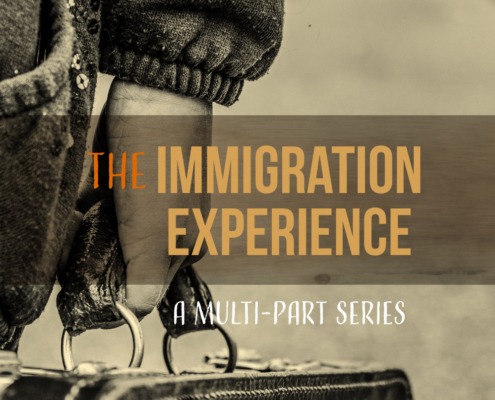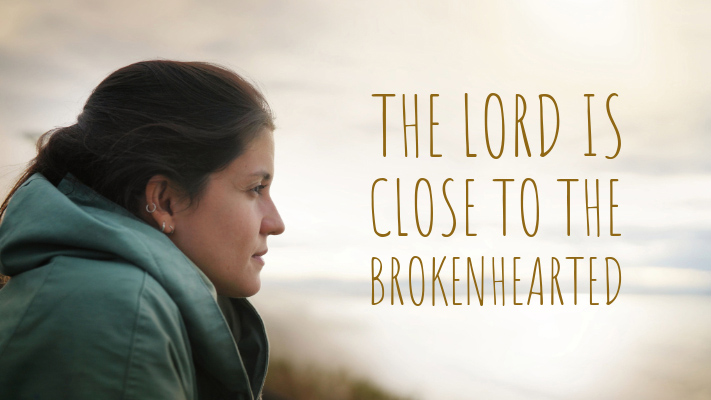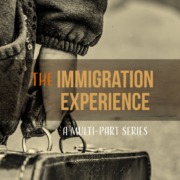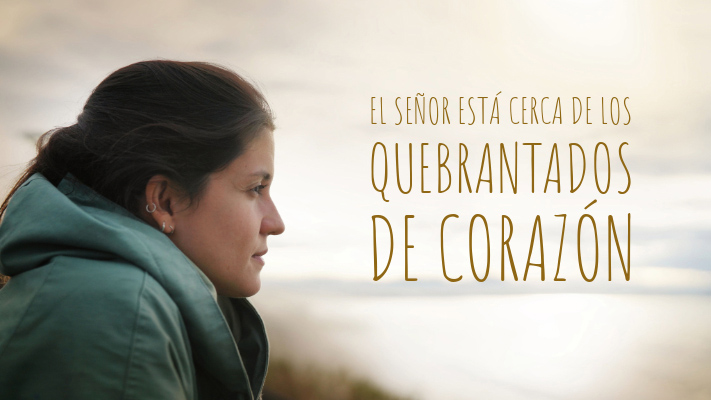Overcoming Grief During Immigration
By Carolina Acosta
Blessed are those who mourn, for they will be comforted. Matthew 5:4

Packing our life in 8 suitcases…
“Leaving a beautiful country where you grew up surrounded by your uncles, grandparents and a bunch of unruly cousins was without a doubt one of the most important decisions we have had to make in our lives, especially because my children would not grow up knowing how wonderful it is to have to all your family around. Turning around and seeing what we left behind today still hurts, I think you just learn to live with that on your chest. But when I look ahead and realize that the future that awaits your children will never compare to what they would have had if we had not made the decision. My soul feels relief, it comforts me to see them achieve things that I never even imagined they would experience, I feel pride. Without a doubt, coming to a country of opportunities, where culturally there is respect for the laws and Society to provide a better quality of life to my family is a high price to pay, for all the family affection that we leave behind. That is why to help us in adaptation we unintentionally cling to friends, who then become your new adoptive family, perhaps seeking to compensate for that affection that you miss, but on the other hand you also learn another level of family union because now we only have each other. Without a doubt something difficult about the adaptation apart from the family detachment was the language, it was frustrating to feel that we couldn’t communicate in the simple things that we have to solve on a daily basis, but nothing that with some time and effort we couldn’t overcome. Today I can proudly say that I have a blessed, beautiful, and incredibly united family. My children are building a successful future at the hand of God, so it was worth it a thousand times PACKING OUR LIFE IN 8 SUITCASES. “
My cousin and her family suffered the grieving process that comes after a loss, as she indicated, not only the material things they left behind, since they could only carry two suitcases each, but also the most painful thing was the detachment from the family and friends.
Grief is the normal process of reacting to a loss. Emotional reactions of grief can include anger, guilt, anxiety, sadness, and despair. Physical reactions of grief can include sleeping problems, changes in appetite, and physical problems. Even though grieving is a very unique and personal experience, Elizabeth Kubler-Ross describes the five stages of grief:

Even though grieving is a very unique and personal experience, Elizabeth Kubler-Ross describes the five stages of grief:
- Denial: refers to the period of grieving during which a person refuses to accept the reality of a situation.
- Anger: can be a natural response directed toward oneself, family members, even toward God.
- Bargaining: a person attempts to negotiate or make compromises. you may try to bargain to change the situation, agreeing to do something in return for being relieved of the pain you feel.
- Depression: Feelings of depression like sadness, loss of interest in activities you normally enjoy, changes in sleep, lack of energy, guilty feelings, and decreased concentration.
- Acceptance: Acceptance refers to the period of grief when we finally come to terms with accepting the reality of our loss. When we have reached this stage of acceptance, we no longer deny or struggle against our grief. During this time, we work to focus our energy on making plans for moving forward.
People who are grieving do not necessarily go through the stages in the same order or experience all of them. But it is helpful to know about them so we can understand our process and people surround us. It also helps to understand that it is a natural process, that we must allow ourself to live it and feel it, for the time it lasts. But we are not alone.
As we grieve, we cling to God’s promises:
- He is by our side: The LORD is close to the brokenhearted and saves those who are crushed in spirit (Psalm 34:18)
- He heals us: He heals the brokenhearted and binds up their wounds. (Psalm 147:3)
- He consoles us: Blessed are those who mourn, for they will be comforted. (Matthew 5:4).
 Fortunately, my cousin managed over time to overcome the grief that moving to another country meant, although she confesses that it still hurts. But this is not the case for many people I have had the opportunity to help and who can get stuck in some of the stages of grief.
Fortunately, my cousin managed over time to overcome the grief that moving to another country meant, although she confesses that it still hurts. But this is not the case for many people I have had the opportunity to help and who can get stuck in some of the stages of grief.
One of the issues that I have frequently seen is when people remain stuck looking back, attached to the past, to the country of origin, without being able to look forward, to the future, or even to the present. The opportunity to look at the blessings that God gives us every day is lost. The person may express it with anger, sadness, constantly looking at and remembering what they lost, focusing on the loss most of the time, talking about it, remembering what they left behind, even in an idealized way. They may even express that they regret the decision to immigrate, or think about the possibility of returning every time there is a problem. Sometimes there are relationship problems or family conflicts when one of the family members continues to look back.
We see this difficulty of continuing to look back in a story from the Bible: Lot’s wife Genesis 19: 15-26
15 With the coming of dawn, the angels urged Lot, saying, “Hurry! Take your wife and your two daughters who are here, or you will be swept away when the city is punished.”… 16 When he hesitated, the men grasped his hand and the hands of his wife and of his two daughters and led them safely out of the city, for the LORD was merciful to them. 17 As soon as they had brought them out, one of them said, “Flee for your lives! Don’t look back, and don’t stop anywhere in the plain! Flee to the mountains or you will be swept away!”… 26 But Lot’s wife looked back, and she became a pillar of salt.
In the “People’s Bible,” Pastor Jeske noted that Lot’s wife continued to look back at the city that had been her home and where she had left her heart. Although we are not literally going to turn into a pillar of salt, we know excessive looking back and leaving our hearts in the country we are no longer in, will negatively affect the natural process that grieving should have. Clinging to material, earthly things is a tendency of our sinful nature. We see it equally in the warning that Jesus gave us to prepare for his next coming: “On that day no one who is on the housetop, with possessions inside, should go down to get them. Likewise, no one in the field should go back for anything. 32 Remember Lot’s wife! ” (Luke 17:31-32).
At the time we leave these things we left behind may seem so important and necessary. In my case I remember we left “valuable” things in a box in Venezuela. We had the hope of one day getting them back, but that never really happened. Today, I do not know where the box with “our valuables things” is, in fact I don’t even remember what was in it. We live temporarily. It is very important to learn to detach ourselves from material things, remember daily to set our minds on things above, not on earthly things. (Colossians 3:2).
If you are reading this blog and feel that this is your case, we invite you to reflect on your attachment to the country you left. Ask yourself what are you attached to in your country of origin? The family? The previous job? The material things you left behind? The traditions?.

Once you have identified it, it can be useful to take some time to say goodbye to what you are still attached to that does not allow you to move forward. When a family member dies, we begin the grieving process with an event, the funeral, where we express our emotions, share with our loved ones and it is also a time to say goodbye to that person. This is not the case when we immigrate. It can be useful to dedicate some time to doing activities that will help you say goodbye to that past that you had in your country of origin:
Saying Goodbye
- Say a good bye: think of this as a way of making the end of one chapter and the beginning of another. You can gather with your family or just by yourself, bring an object or photo that symbolizes your memories in your country. Take turns to everybody can say anything you need to say.
- Write a letter, a poem, a diary: can provide an outlet for your emotional pain. You can also start a journal to record memories as they come to you.
- Create a ritual: can help you heal and give you an opportunity to reflect on the past you left behind. You can release a balloon with a message, gather pictures with happy memories, or listen to songs that remind you your foreign country, but once again, take the opportunity to say good bye and thank God for the blessings during that chapter of your life.
We invite you to look at your Present, to remember that the most important thing is already with you today in this country and wherever you go. Sometimes Is hard to detach because we identify ourselves with the thing we lost. Your identity is beyond your profession, your citizenship, the things you have. Remember who you are today in Christ. This is your identity in Christ:
Your Identity
- You are a loved child of God: “For God so loved the world that he gave his one and only Son, that whoever believes in him shall not perish but have eternal life”. (John 3:16)
- You are redeemed: “Do not fear, for I have redeemed you; I have summoned you by name; you are mine.” Isaiah 43:1
- You are saved: “For its by grace you have been saved, through faith, and this not from yourselves, it is the gift of God, not by works, so no one can boast”. (Ephesians 2:8-9)
- You are forgiven: “If we confess our sins, he is faithful and just and will forgive us our sins and purify us from all unrighteousness..” (1 John 1:9)
- You are fearfully and wonderfully made: “For you created my inmost being; you knit me together in my mother’s womb. I praise you because I am fearfully and wonderfully made…” (Psalm 139:13-14)
Make a list of the blessings that God has given you and think about them daily.
Finally, we also invite you to look towards the Future with hope. Make yours the promise that God gave to his people of Israel when they were exiled in Babylon. They were away from their country and their culture and their families. They could take little or nothing with them.
“Build houses and settle down; plant gardens and eat what they produce. Marry and have sons and daughters; find wives for your sons and give your daughters in marriage, so that they too may have sons and daughters. Increase in number there; do not decrease. Also, seek the peace and prosperity of the city to which I have carried you into exile. Pray to the LORD for it, because if it prospers, you too will prosper.” … For I know the plans I have for you,” declares the LORD, “plans to prosper you and not to harm you, plans to give you hope and a future. Then you will call on me and come and pray to me, and I will listen to you. You will seek me and find me when you seek me with all your heart.” Jeremiah 29:4-7,11-13





 Fortunately, my cousin managed over time to overcome the grief that moving to another country meant, although she confesses that it still hurts. But this is not the case for many people I have had the opportunity to help and who can get stuck in some of the stages of grief.
Fortunately, my cousin managed over time to overcome the grief that moving to another country meant, although she confesses that it still hurts. But this is not the case for many people I have had the opportunity to help and who can get stuck in some of the stages of grief.